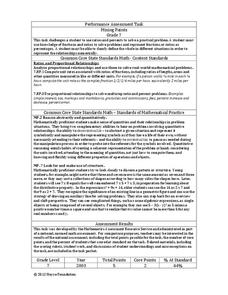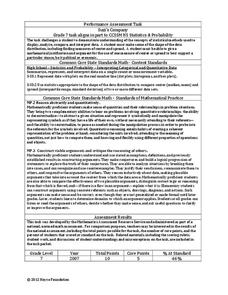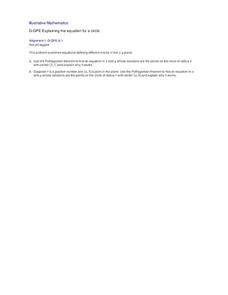Inside Mathematics
Coffee
There are many ways to correlate coffee to life, but in this case a instructional activity looks at the price of two different sizes of coffee. It requires interpreting a graph with two unknown variables, in this case the price, and...
Noyce Foundation
Mixing Paints
Let's paint the town equal parts yellow and violet, or simply brown. Pupils calculate the amount of blue and red paint needed to make six quarts of brown paint. Individuals then explain how they determined the percentage of the brown...
Inside Mathematics
Hexagons
Scholars find a pattern from a geometric sequence and write the formula for extending it. The worksheet includes a table to complete plus four analysis questions. It concludes with instructional implications for the teacher.
Inside Mathematics
Swimming Pool
Swimming is more fun with quantities. The short assessment task encompasses finding the volume of a trapezoidal prism using an understanding of quantities. Individuals make a connection to the rate of which the pool is filled with a...
Noyce Foundation
Rabbit Costumes
How many rabbit costumes can be made? This is the focus question of an activity that requires scholars to use multiplication and division of fractions to solve a real-world problem. They determine the amount of fabric necessary for eight...
Inside Mathematics
Quadratic (2006)
Most problems can be solved using more than one method. A worksheet includes just nine questions but many more ways to solve each. Scholars must graph, solve, and justify quadratic problems.
Inside Mathematics
Party
Thirty at the party won't cost any more than twenty-five. The assessment task provides a scenario for the cost of a party where the initial fee covers a given number of guests. The class determines the cost for specific numbers of guests...
Inside Mathematics
Rugs
The class braids irrational numbers, Pythagoras, and perimeter together. The mini-assessment requires scholars to use irrational numbers and the Pythagorean Theorem to find perimeters of rugs. The rugs are rectangular, triangular,...
Inside Mathematics
Suzi's Company
The mean might not always be the best representation of the average. The assessment task has individuals determine the measures of center for the salaries of a company. They determine which of the three would be the best representation...
Inside Mathematics
Winning Spinners
Winning a spin game is random chance, right? Pupils create a table to determine the sample space of spinning two spinners. Individuals determine the probability of winning a game and then modify the spinners to increase the probability...
Inside Mathematics
Marble Game
Pupils determine the theoretical probability of winning a game of marbles. Individuals compare the theoretical probability to experimental probability for the same game. They continue on to compare two different probability games.
Beauty and Joy of Computing
Building Your Own Blocks
Isn't building with blocks an activity for toddlers? The third lab of a five-part unit teaches young computer scientists how to create their own block instructions for programming. They use these blocks to create geometric figures, spell...
PBL Pathways
Students and Teachers
Predict the future of education through a mathematical analysis. Using a project-based learning strategy, classes examine the pattern of student-to-teacher ratios over a period of years. Provided with the relevant data, learners create a...
Colorado State University
What Is Energy?
Don't let the energy of your classroom falter! Explore the scientific definition of energy through play. A hands-on lesson focuses on the change of energy from one form to another.
Kenan Fellows
Dinner Party: Using Pattern Trains to Demonstrate Linear Functions
Nothing fancy here ... just your run-of-the-mill Algebra party! Learners explore the patterns of linear functions while designing seating arrangements for a dinner party. Comparing the number of tables to the perimeter of the combined...
National History Day
Why Did the United States Enter World War I in 1917?
World War I was the first major conflict on a global scale. Using primary documents, learners determine why the United States chose to enter World War I when it did. After analytical writing and group research, the causes of America's...
California Education Partners
Colorful Data
Scale up your lessons with a performance task. Young data analysts work through an assessment task on scaled bar graphs. They answer questions about a given scaled bar graph on favorite colors, analyze a bar graph to see if it matches...
Council for Economic Education
Green Eggs and ...Economics?
Scholars use four different children's books by Dr. Seuss to analyze microeconomic concepts. Group presentations and research help them better understand simple economic concepts through simple stories.
Curated OER
Flexible "Glass" Sculpture
Older artists create 2-dimensional surfaces with paint, then use these paintings as the components of a 3-dimensional sculpture. They assemble a free-standing sculpture that may be viewed from any angle by using wire to create the shape....
Curated OER
Incorporating 3D Visualizations into Your Classroom
Students make observations through 3-D visualizations. They explore scientific and geologic processes through the use of 3-D pictures.
Curated OER
Drinking Juice
Pictures, number lines, decimal equivalents, or Cuisenaire rods can be used to show insight into the meaning of multiplying fractions.Here, Alisa drinks 3/4 of 1/2 liter of juice. To find the total volume of the juice that Alisa...
Curated OER
Explaining the equation for a circle
By first starting with an explicit example of a radius and center point, this challenging lesson tries to help students gain an understanding of the Pythagorean theorem and the equation of a circle. Once they have accomplished the first...
Illustrative Mathematics
Busy Day
This activity gets at the heart of algebraic reasoning and setting up equations with one variable to solve real-world problems. The worksheet has only one problem, but it requires that learners first use their own reasoning...
Illustrative Mathematics
Computing Volume Progression 2
Once your geometers know how to apply the formula V = l w h, they will be ready to take on the fractional volume of a fish tank. Have your number crunchers swap heights so they can see that the fractional volume will not change.
Other popular searches
- Abstract Nouns
- Abstract Art
- Concrete and Abstract Nouns
- Abstract Nouns Worksheets
- Abstract Flowers
- Abstract Art Picasso
- Abstract Expressionism
- Abstract Music
- Abstract Geometry
- Abstract Impressionism
- Abstract Drawing
- Adjectives and Abstract Nouns























